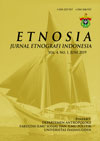Abstract
This article aims to explain whether the social movements carried out on the internet are limitedto click activism or merely mere symbolic resistance, or even beyond that? The case of the social movement raised in this study is the Akademi Berbagi Movement based on the internet, especially social media. the movement that combines online and offline gives its own nuances in doing social movements. This study used a qualitative approach with the method of connected ethnography carried out for 5 months. From the results of the research, the Akademi Berbagi Movement is one of the forms of the birth of civil society. The movement that combines online and offline has provided the context, validation and attachment of more participation by volunteers in carrying out social movements, thus giving birth to what is called 'online social movements'. This also complements the concept that Nugroho (2011) refers to as "click activism", with the case of the movement raised in this study, social movements carried out on the internet exceed what is called click activism, and volunterism is done more than just being involved in movement online, but volunterism is also done in an offline context so that this movement is not just "click" but also provides real space for movement.
References
Axel, i. K. (2004). The Context of Diaspora. Cultural Anthropology vol. 19: 26-60.
Baym, N. K. (1995). "The Emergence of Community in Computer-Mediated Communication," in Cybersociety: Computer-Mediated Communication and Community. Edited by S. G. Jones, pp. 138-163. Thousand Oaks, CA: SAGE Publications.
Bender, T. (1982). Community and Social Change in America, 2 edition. Baltimore: John Hopkins. University Press.
Bell, david. (2001). An Introduction to Cyberculture. Routledge. Taylor & Francis Group. London and new York.
Bromberg, H. (1996). "Are MUDs Communities? Identity, Belonging and Consciousness in Virtual Worlds," in Cultures of Internet: Virtual Spaces, Real Histories, Living Bodies. Edited by R. Shields, pp. 143-152. Thousand Oaks: Sage.
Cohen, R. (1996). Diasporas and the nation-state: from victims to challengers. International Affairs 72:507-520.
Escobar, Arturo., Hess, David., Licha, Isabel., Sibley, Will., Strathern, Marilyn., Sutz, Judith. (1994). Welcome to Cyberia: Notes on the Anthropology of Cyberculture [and Comments and Reply]. Current Anthropology, Vol. 35, No. 3 (Jun., 1994), pp. 211-231 di akses pada tanggal 28 februari 2011 www.jstor.org
Faisal, Moch. (2008). Dari Anarchic Cyber Space menjadi Transnational Public Sphere: Membaca Relasi antara Cyberspace dan Civil Society di Era Postmodern. Diterbitkan oleh Global Jurnal Politik Internasional vol. 9 No.2 Desember 2007 – Mei 2008. Departemen Ilmu HI. FISIP Universitas Indonesia.
Galston, W. A. (2000). Does the Internet Strengthen Community? National Civic Review 89:193202.
Hine, Cristian. (2000). Virtual Ethnography. SAGE Publication.
Howard, P. N., and S. Jones. Editors. (2004). Society Online: The Internet in Context. Thousand Oaks: Sage Publications.
Ignacio, E. (2005). Building Diaspora: Filipino Community Formation on the Internet. New Jersey: Rutgers University Press.
Ismail, Ahmad. (2010). Berteman Lewat Facebook. Studi Jaringan Sosial Mahasiswa Fisip Unhas. (Skripsi). Fisip Universitas Hasanuddin.
Nugroho, Yanuar. (2011). @ksi Warga: Kolaborasi, demokrasi partisipatoris dan kebebasan informasi – Memetakan aktivisme sipil kontemporer dan penggunaan media sosial di Indonesia. Laporan. Kolaborasi penelitian antara Manchester Institute of Innovation Research, University of Manchester dan HIVOS Regional Office Southeast Asia. Manchester dan Jakarta: MIOIR dan HIVOS.
Schmier, Stephanie Anne, (2010). Our Space: Researching Literacies and Identities in and across classroom and Online spaces. Dissertation. Columbia University.
Scoot, J. (2007). Senjatanya Orang-orang yang Kalah. Penerbit Yayasan Obor Indonesia.
Singh, Rajendra. (2010). Gerakan Sosial baru. Penerbit Resist Book. Yogjakarta.





